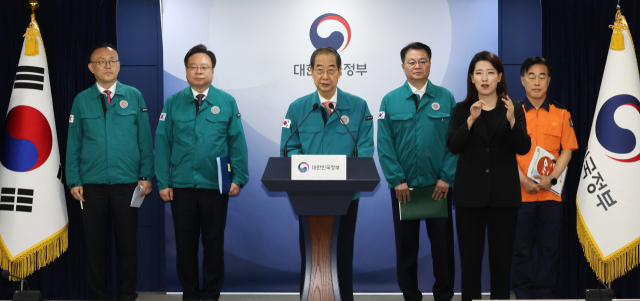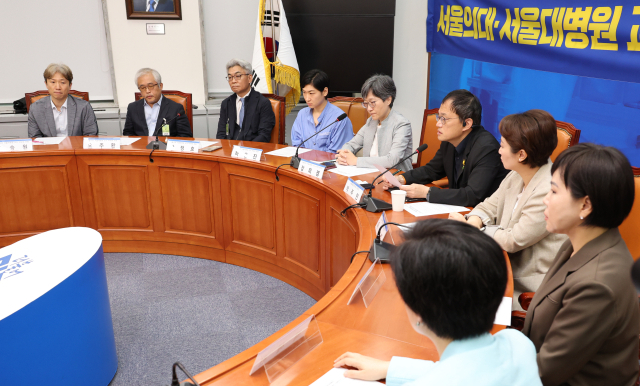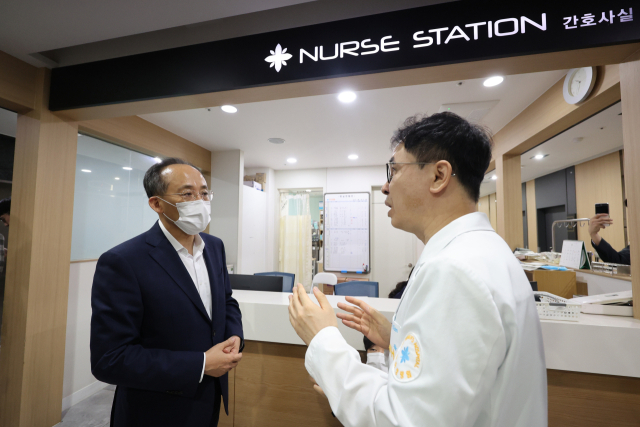Controversy grows over formation of ruling-opposition dialogue body in the healthcare sector
Hospital associations consider participation positively, while hardliners insist on delaying medical student reinforcements,

Prime Minister Han Duck-soo is briefing on the results of the Central Disaster and Safety Headquarters meeting of the Doctor Collective Action at the Government Seoul Office in Jongno-gu, Seoul on the 12th. Left to right in the back row: Director of the Disaster Safety Management Bureau Lee Han-kyung, Minister of Health and Welfare Cho Gyu-hong, Director of the National Security Office Bang Ki-seon, and Fire Commissioner Heo Seok-gon. Yonhap News,
, ‘[Seoul Economy]’,
,
, ‘As opposition leader Han Dong-hoon of the People Power Party raised the issue of an “ruling-opposition dialogue body without a restricted agenda,” attention is focused on whether the body will be established before the Chuseok holiday. Amidst the assertion by hardliners such as the Korean Medical Association (KMA) that “it is difficult to participate in the body without the government clearly expressing the will to adjust the 2025 student quota increase,” the fact that some hospital organizations and other factions in the medical field are lifting their heads in favor of dialogue is seen as a positive development.’,
,
, ‘According to medical sources on the 12th, the Korean Hospital Association, the Council of Superior General Hospitals, and the Council of Advanced Training Hospitals, among other hospital organizations, are giving positive consideration to participating in the ruling-opposition dialogue body. The Hospital Association, which represents over 3,500 hospitals nationwide, is already participating in the Presidential Commission for Healthcare Reform. Yoon Eul-sik, chairman of the Council of Advanced Training Hospitals (Kyung Hee University Medical Center), told Seoul Economic Newspaper that “Isn’t it right to engage in dialogue about forming a ruling-opposition dialogue body without a restricted agenda?”, but also mentioned, “There is an opinion that what is the point of forming a body without the participation of residents and medical students. We are internally considering participation.”‘,
,
,

Park Joo-min, special committee chairman of the Democratic Party of Korea, speaks at a meeting with the Seoul Medical Emergency Measures Special Committee, the Seoul University and Seoul National University Hospital Professors’ Emergency Committee at the National Assembly in Yeouido, Seoul on the morning of the 12th. Yonhap News,
,
, ‘A hospital association official said, “We are considering whether to participate in the dialogue body. The decision will likely be made based on the overall atmosphere.” In the medical field, as many hospitals are struggling with management difficulties due to residents’ mass exodus, there is a high possibility of participation to receive government financial support such as health insurance prepayment for medical expenses. Previously, the Ministry of Health and Welfare, upon learning that some university professors were planning to participate in the collective strike led by the KMA, requested hospital directors to disallow faculty strikes while warning that if left unchecked, they would be excluded from health insurance prepayment eligibility.’,
,
, ‘The medical institutions that are listed as recipients of the letter sent by the People Power Party urging them to participate in the ruling-opposition dialogue body include the Korean Society of Resident Physicians (KSRP), the Korean Association of Medical Colleges and Graduate Schools Student Association (KAMCGA), the Council of Superior General Hospitals, the Korean Hospital Association, the Council of Advanced Training Hospitals, Seoul National University Hospital, Severance Hospital, Samsung Medical Center, Seoul Asan Hospital, Seoul St. Mary’s Hospital, the Korean Medical Association (KMA), the Council of National Medical University Professors (CNMUP), the Council of National Medical University Professors Emergency Committee (CNMUPEC), the Korean Academy of Medical Colleges, and the Korean Medical Association, totaling 15 organizations. Jinwoo Lee, president of the Korean Medical Association, expressed a positive attitude towards the proposal of the ruling-opposition dialogue body during a press conference on the “Improvement of Internship Training System and Residency Training Environment for Resident Physicians” held on the 11th, stating, “We welcome the proposal of the ruling-opposition dialogue body. Since the start and end of medical policy are determined by the government, the most important thing for the dialogue body to have a substantive impact is for the government’s attitude to change.”‘,
,
,

Choo Kyung-ho, floor leader of the People Power Party, visits Lin Women’s Hospital in Dongdaemun-gu, Seoul on the morning of the 12th to inspect the emergency medical system in preparation for the Chuseok holiday. Yonhap News,
,
, ‘”Seoul National University Hospital, Severance Hospital, Seoul Asan Hospital, Samsung Medical Center, Seoul St. Mary’s Hospital, and other top 5 hospitals are still undecided on their participation in the dialogue body. However, as the Council of Superior General Hospitals, which represents 47 tertiary hospitals, views dialogue positively, there is a high likelihood that they will follow suit. Many medical organizations are actively considering participating in the ruling-opposition dialogue body.”‘,
,
, ‘Nevertheless, it seems challenging to achieve unity in the medical field. The Korean Medical Association (KMA), a legal entity in the medical field, firmly stated, “There are no doctors to enter the dialogue body.” Most importantly, residents and medical students, who hold the key to resolving the medical crisis, have been silent since the proposal of the dialogue body, leading to the skepticism that a full-fledged ruling-opposition dialogue body is unlikely to be established. An anonymous university hospital professor stated, “They say there are no restrictions on the agenda, but won’t the government just lead as they wish? What use is it to form any body if residents and medical students do not participate? The situation will not be resolved unless residents and medical students participate.”‘,
,
, ‘Another obstacle to the establishment of the ruling-opposition dialogue body is the incomplete clarification of the positions between the ruling and opposition parties. Park Joo-min, chairman of the National Assembly’s Health and Welfare Committee and a Democratic Party member, expressed doubt, saying, “Our immediate response is to resolve the current situation and normalize medical education by raising all medical issues for discussion, including the normalization of medical school quotas for 25 years.” He added, “Although Party leader Han Dong-hoon agreed with this, there are different voices from the government and the ruling party, which raises suspicion.”‘,
,
, ‘Kang Hee-kyung, vice-chairman of the Seoul University Hospital and Seoul National University Professors Emergency Committee, who attended the meeting, said, “The essence of this issue is not simply the size of the 2,000-person increase, but the collapse of trust stemming from the annulment of the 2020 agreement.” He emphasized that creating a situation where residents and medical professionals can regain hope is urgently necessary. Today’s meeting was a request to create conditions for participation before discussing participation in the dialogue body.’,
,
, ‘Concerns have emerged that even before the ruling-opposition dialogue body, which has finally entered the discussion table, is established, it may derail and go astray. Amidst the complexity of medical groups over the political proposal of a “ruling-opposition dialogue body,” patient groups have also demanded participation. The Korea Federation of People with Severe Diseases held a press conference at the National Assembly Communication Center on this day, stating, “We cannot help but be disappointed and angry that they are creating a ruling-opposition dialogue body and only seeking the opinions of the medical field, including resident physicians, without asking for the opinions of patient groups.” They insisted, “Instead of a ‘ruling-opposition dialogue body,’ we formally propose the establishment of a ‘ruling-opposition patient dialogue body.'” They argue that patient groups must participate to establish effective healthcare policies since they are directly affected by medical policies.’,
,
, ‘Professor Lee Joo-ryang, a professor of health administration at Namseoul University, stated, “Isn’t it off the mark for hospital organizations, especially those composed of hospital directors participating in the existing Presidential Committee for Healthcare Reform, to participate in the currently discussed ruling-opposition dialogue body? If these organizations are represented as the voice of the medical field, the likelihood of residents and medical school students participating is very low.” He stressed, “It is imperative that residents and medical school student organizations participate.”‘,
,
,

